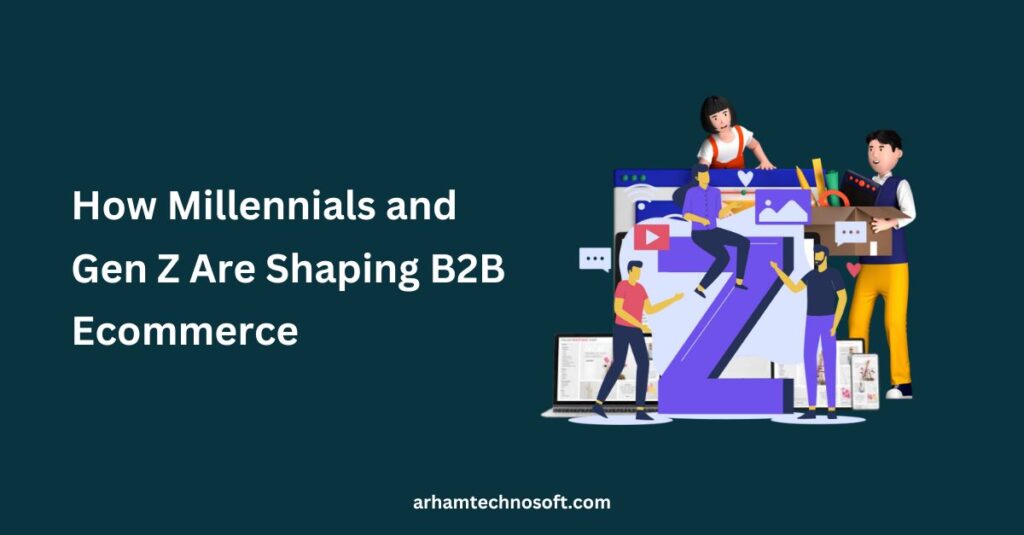Why Millennials and Gen Z Are Driving the B2B Ecommerce Boom: Key Benefits
In the last few years, B2B ecommerce has experienced massive change in which two generations are at the helm: Millennials and Gen Z. In fact, by 2025, 70% of all B2B buyers are projected to be millennials, and Gen Z influence has already begun to be seen in the business world. So together, these two generations are dramatically changing the way businesses deal with suppliers, as well as the way in which they make buying decisions. Understanding the impact of Millennials and Gen Z on B2B sales is, therefore, important for any company seeking success in the emerging digital marketplace.
The Rise of B2B Ecommerce
In B2B ecommerce, growth is forecasted to hit $7.7 trillion by 2025, far ahead of direct to consumer (DTC) sales, estimated at $3.8 trillion. This shift will primarily be led by younger generations such as Millennials and Gen Z, who not only want but expect a seamless online, digital first buying experience. With more B2B sales being transferred online, business houses have no choice but to adapt to these tech savvy generations in order to be competitive.
Key Benefits of B2B Ecommerce for Millennials and Gen Z
1. Increased Brand Recognition
For companies venturing into B2B ecommerce, one significant advantage is the boost in brand recognition. Millennials and Gen Z, who are accustomed to seamless digital shopping experiences, expect the same level of ease in B2B transactions. By expanding into B2B, businesses can leverage resellers and retail partners to amplify their brand visibility. Unlike DTC models, where customer-driven exposure is crucial, B2B ecommerce allows brands to tap into new networks, gaining exposure in multiple retail environments.
2. Lower Customer Acquisition Costs
Another great advantage that B2B ecommerce provides is the reduction in customer acquisition costs. This is because most B2B selling is usually done through facials and cold calling; however, in today’s ecommerce, there is platform Shopify, which automates many processes, thereby saving overhead costs. Millennials, who are comfortable with digital communication, as well as Gen Z, prefer a streamlined, online purchasing process. This makes the sales cycle faster and more efficient, enabling businesses to reach new clients at a lower cost.
3. Higher Order Volume and Value
Millennials and Gen Z are both influencing B2B ecommerce strategies by driving higher order volumes. B2B buyers often place large, frequent orders, unlike DTC customers who typically make smaller, individual purchases. Through ecommerce platforms, businesses can offer bulk ordering, personalized pricing, and self-serve portals features that cater to the expectations of millennial and Gen Z buyers for convenience and speed.
4. Default Loyalty Creates Predictable Revenue
Long term relationships are a hallmark of B2B sales, and both Millennials and Gen Z are increasingly influencing repeat business. Once a millennial or Gen Z led client is secured, repeat orders are common, which leads to more predictable and stable revenue streams. B2B companies can cultivate lasting relationships with these buyers through subscription models, loyalty programs, and personalized service, which create consistent revenue that can scale over time.
5. Automated Sales and Business Processes
B2B sales are quite complex, but platforms like Shopify have made automation tools to simplify the process. Millennials and Gen Z are also all about speed and efficiency, which makes manual processes like order input, invoicing, and customer communication become outdated pretty quickly. Automation saves businesses time and resources so they can focus on building relationships and enhancing the customer experience. This is very necessary for meeting demands from today’s millennial and Gen Z B2B buyers, demanding fast, dependable service.
6. Offload International Distribution
Expanding into international markets can be daunting, but B2B ecommerce simplifies the process by offloading distribution responsibilities onto wholesale partners. Products can be shipped to one location, and B2B partners handle the distribution in new markets. This global reach is particularly appealing to millennial and Gen Z buyers, who want access to international markets from the convenience of a single digital storefront.
7. Reduced Operational Costs
Main advantage B2B ecommerce brings is a decrease in operational costs. Large B2B orders fewer shipments make, meaning less cost in packaging and shipping. Automation in the order process also reduces administrative cost. In addition to these benefits, businesses have to invest in an appropriate robust B2B platform like Shopify to maintain operational efficiency in scaling up.
8. Enhanced Personalization and Customer Experience
Personalization is extremely important for both DTC and B2B success, and for millennial and Gen Z buyers, expectations are particularly high. The strategies for ecommerce for these generations tend to be centered around delivering personalized experiences: special deals, customized product offerings, and tailored pricing. Through utilizing data analytics, businesses can be assured that each interaction with the B2B buyer feels unique and relevant. Millennial and Gen Z buyers appreciate businesses that understand their specific needs and offer flexible solutions that improve the overall purchasing experience.
9. Higher Customer Retention Through Ongoing Support
Millennials and Gen Z value ongoing support and engagement, which leads to higher customer retention in B2B ecommerce. In a traditional B2B relationship, businesses provide dedicated account managers who offer advice, troubleshooting, and personalized recommendations. This high level of engagement helps foster long-term loyalty, which is key for maintaining a competitive edge in the marketplace.
10. Scalability and Flexibility
B2B ecommerce offers the scalability that many businesses need to grow. With Shopify’s ability to manage both B2B and DTC operations from a single platform, businesses can scale efficiently. The flexibility of these platforms allows companies to manage inventory, pricing, and customer relationships seamlessly, supporting both bulk orders and individual consumer sales. This flexibility is essential for businesses that want to cater to the expectations of millennial and Gen Z buyers while staying competitive as the market evolves.
Looking Ahead: The Future of B2B Ecommerce
In fact, going by the changes predicted for 2025 for B2B ecommerce growth, we can very well see Millennials and Gen Z in the mainstream leading that change. For them is digital-first, purchase experience with its impact on the sales strategies. Companies that meet their needs and cater to those of the changing markets will see growth.
By embracing the critical B2B ecommerce benefits of automation, personalization of services, and scalability, companies can meet not only the needs of Millennial and Gen Z buyers but set themselves up for long term success. Whether it’s an initiation into B2B ecommerce or a refining process for strategies, understanding how these generations influence B2B sales is vital in staying ahead of this rapidly shifting market.
Conclusion
The shift to B2B ecommerce, led by Millennials and Gen Z, is changing the face of industries. With the right B2B ecommerce strategies for these generations, brands can increase sales and build more enduring relationships with their customers. As the B2B landscape continues to evolve, innovation, efficiency, and personalization will be at the forefront of businesses that capture the millennial and Gen Z market and achieve sustained success.
Industries are being remade as millennials and Gen Z lead the move to B2B ecommerce. The competitive business has to become innovative, efficient, and personalized for its B2B strategies. Shopify development services will help create a seamless digital-first buying experience tailored to today’s buyer’s needs. The right platform can get you an ecommerce solution that scales and future proofs for long-term success.

